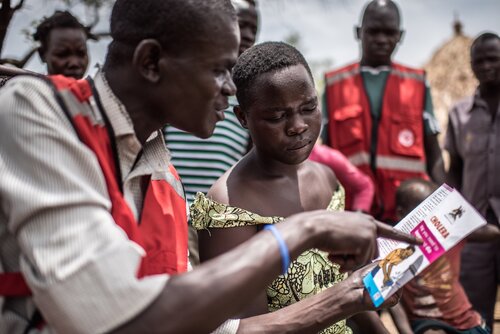New analysis for country teams: Perspectives of 52...
1 April 2019
The International Federation of Red Cross and Red Crescent Societies (IFRC) shares its perspective on UHC, and how they are working to achieve it.

The International Federation of Red Cross and Red Crescent Societies (IFRC) is the world's largest humanitarian organization, providing assistance without discrimination as to nationality, race, religious beliefs, class or political opinions. Founded in 1919, the IFRC comprises 191-member Red Cross and Red Crescent National Societies, a secretariat in Geneva and more than 60 delegations strategically located to support activities around the world. There are more societies in formation.
Health and community care are the key focus of IFRC’s work. Around the world, hundreds of thousands of volunteers work in communities to promote health, prevent diseases and offer care to the most vulnerable people.
The International Federation of Red Cross and Red Crescent Societies (IFRC) and its National Societies actively support communities through their network of volunteers, community-based approach, expertise and experience. Health and care activities in the IFRC include first aid and emergency response as well as epidemic control, programmes in health promotion and prevention, addressing stigma, providing psychosocial care and enabling community empowerment.
Why does UHC matter to the IFRC Network?
Reaching the last mile
IFRCs vision is to enable healthy and safe living for all. We seek to reduce preventable death and disease through improved access to health care for underserved communities and the most vulnerable. We seek in particular to “reach the last mile”, to provide health and care to those who are outside or at the margin of the formal health sector. This is an essential component of the UHC agenda and one we intend to highlight continuously.
Local organizations and community-based health workers are key to ensuring UHC
Local health actors and teams of health workers (both staff and volunteers) who are present in the community make significant contributions to the health and wellbeing of communities, even when trained in the most basic of public health and health literacy activities.
This is a key value of our National Societies: they have community presence, reach and access that very few possess and are therefore able to contribute to achieving UHC on the ground. National Society staff and community-based volunteers speak their peoples' language; they know their customs; they are there among them long before a crisis, and long after it. They are often the only ones who have access to the most vulnerable people and the hardest to reach, in places which are often without schools, without hospitals, without government.
Volunteers supporting the formal health workforce
Our national society volunteers and other volunteers around the world play an essential role in achieving UHC in ‘last mile’ communities. They provide screening and health services in clinics for unregistered migrants across Europe; they conduct safe and dignified burials of suspected Ebola victims in DRC; they respond with first aid in small scale emergencies, like a road accident, and in large scale emergencies like earthquakes or floods. Volunteers are central to the attainment of UHC and we strive to have their role more explicitly recognised in this discussion around human resources for health. The gratuity of their time and work is a major asset that should be universally recognised, appreciated and promoted.
Supporting the helpers
Community-based health workers and volunteers have seen limited investments. Their full potential remains currently underutilised, and in some cases, under-valued. We need to invest in community-based health workers and volunteers to ensure they meet their full potential.
We also need ensure that our discussion is mindful of, and sensitive to, the health and wellbeing of all community health workers and volunteers, and that adequate attention is paid to the unique challenges and vulnerabilities that workers and carers themselves may experience. For example, they may be victims of insecurity and attacks when working in fragile or conflict environments such as has occurred in the2018-2019 DRC Ebola outbreak. We need to ensure we provide adequate support in terms of funds for safety and security management, insurance or other forms of coverage in the event of accident or death and mental health and psycho-social support for those who need.
IFRC network recommendations
1. Invest in human resources for health, in terms of quantity and quality, particularly in low- and middle-income settings;
2. Prioritize meeting the unmet health needs of vulnerable or marginalised populations not served by formal health systems during emergencies in low and middle-income settings, but also in more affluent countries;
3. Support the capacity of countries in disease outbreak preparedness, detection and response; and
4. Ensure financial protection for individuals and families exposed to catastrophic health expenditures.
What does IFRC hope to contribute to UHC2030?
We believe in ensuring the engagement of communities in decisions about their future and in participating in the fulfilment of the UHC agenda, including in the critical process leading up to the United Nations General Assembly High-Level Meeting on UHC on 23 September 2019.
We are supporting UHC2030 to engage with all different types of stakeholders and constituencies taking part in shaping our steps towards achieving UHC, including civil society, community-based organizations, governments, inter-government organisations and the private sector. IFRC is officially engaged in the campaign to contribute to drafting the consolidated set of ‘Asks’ which will feed into the political declaration and related advocacy materials.
IFRC aims to engage all its partners around the world and other thematic health CSOs such as those working on malaria, TB and HIV to seek their feedback and input into the campaign. We will take the opportunity at global events to connect with all civil society organisations and bring them into the process.
For CBOs and CSOs who wish to connect with IFRC, or want to find out more please contact: Dr. Lasha Goguadze, Health and Care Department
Photo credit: IFRC
